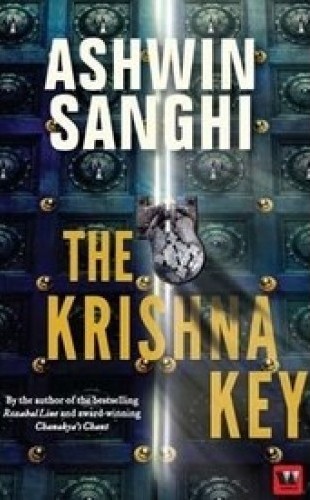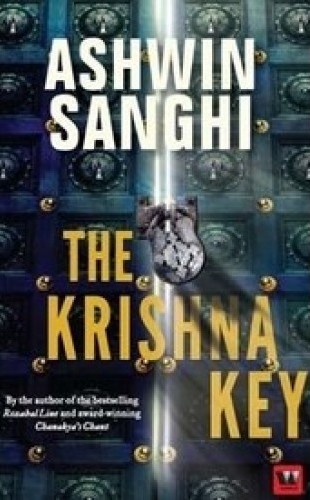
Congratulations for the success of most recent book “The Krishna Key” and thanks for your time for the Interview.
Q: You are a businessman professionally so how do you manage to keep your flame of creativity illuminated?
A: Actually, having a day job in a dreary business is the perfect reason to push one into a creative pursuit. I work Monday to Friday, forty hours per week. When I get home from work, I am relieved to retire to my study and get lost in my fictional world of fantasy, mythology, history and conspiracy. If I were to ever stop working, my writing would become my work… that is a scary thought indeed.
Q: What was your first ever fiction and how much that influenced you?
A: My first novel was a book called The Rozabal Line. I wrote it in 2005 after a visit to the Rozabal shrine in Kashmir. The popular folklore around the tomb was that Jesus Christ had survived the crucifixion and lay buried in Rozabal. I was utterly fascinated with the story and decided to research it extensively. My future books—Chanakya’s Chant as well as The Krishna Key—have both been heavily influenced by my fascination for tantalizing research and conspiracy theories.
Q: How do you define the success of a Novelist?
A:Success consists of different strokes for different folks. I always wanted to be widely read. It wasn’t about earning millions… it was always about being read by thousands of ordinary people. With the terrific sales volumes that my last three books have achieved, I am more than happy with the results. To that extent, I see myself as successful. But I have promises to keep and miles to go before I sleep…
I have always loved writing about characters that have shades of grey.
Q: ‘The Krishna Key’ is your third novel, what keeps you motivated?
A: I think that I am intrinsically a storyteller. I have always loved ‘spinning yarns’… it’s just that I never knew that I could earn a living out of it! I am always in search of the next great story. It is the eternal quest for the next earth-shattering premise that keeps my creative juices flowing.
Q: How do you feel when people compare you with Dan Brown, even when you don’t copy him?
A: At last count, Dan Brown’s books had been translated into 52 languages, and as of 2012, his books had cumulatively sold over 200 million copies. I am rather flattered by the comparison, even if it is misplaced.
Q: Do you think your titles especially ‘The Krishna Key’ will help Indian youngsters to solve their puzzles behind Indian rituals and mythologies?
A: The Krishna Key is a work of fiction and should be read as such. It does not claim to be a scholarly work and hence I would refrain from using it as a guide to our mythology or theology. I have, however, found that the easiest way to bring many lost aspects of our culture or civilization to light is simply by bringing these elements into the realm of popular discussion. Commercial fiction is one route. I always entertain the hope that there will be readers who will use the novel as a starting point before embarking on research of their own.
Q: What are the challenges faced during in-depth research for your recent novel “The Krishna Key”. What were your motivations and roadmap? Your answer will be helpful to young writers.
A: My biggest challenge was the fact that I did not understand Sanskrit. To that extent I had to depend on translations. The second big challenge in researching this sort of material is to distinguish scholarly research from propaganda. The final challenge was to map the research in a manner such that the average reader would not be overwhelmed with the breadth and depth of the information presented.
Q: What motivated you to choose Krishna as protagonist and given a grey shade that was a bit risky in a country like India?
A: I have always loved writing about characters that have shades of grey. Krishna is the lovable cowherd of Gokul and Vrindavan but is also the ruthless strategist of the Mahabharata. He is the brave combatant who kills Kansa and numerous demons but is also the person who flees the battle from Mathura to Dwarka and gets labeled as Ranchor for the rest of his life. He is real in every sense and I can relate to the fact that he is a bundle of contradictions.
Q: Don’t you think that the Krishna Key can be more interesting with the development of Sage’s character and a conversation with sage over alchemy?
A: A novel is like a set of busy road junctions. After you have crossed the junction, you can always speculate regarding which alternative route you could have taken but it is futile. The only road that is relevant is the one that you happen to be on.
Q: What do you think about saturating Indian-Anglo literature with love stories? Is the risk of failure not stopping new writers from exploring their unique styles?
A: You have a valid point. The success of certain genres in the Indian commercial fiction space—for example mythological fiction, campus stories, teenage romances etc.—could possibly act as a deterrent for exploration of newer genres. I earnestly hope that this is not the case. When I wrote The Rozabal Line in 2006, no Indian author was exploring the fusion between history, theology, mythology and fiction. The book eventually spawned an entirely new genre. I hope that we will continue to see innovation.
Q: What is the scope of Indian fiction in international forum?
A: Indian literary fiction has already established a name and reputation for itself globally thanks to individuals like Salman Rushdie, Arundhati Roy, Vikram Seth, Kiran Desai et al. We are still not taken seriously as genre fiction writers—producers of mysteries, thrillers, crime novels, adventures, romances etc. Partly that is because our publishing industry believed that commercial fiction was best left to foreigners. During the last decade the situation has been improving and many writers of commercial fiction have emerged. As they continue to write and garner audiences, they will also find new avenues for global acceptance.
Q: What is your message to young writers and creative professionals to achieve success in literary world as you did?
A: The truth is that it’s not about how good a writer you are… it’s more about how thick-skinned you are. The necessary condition for getting an agent or publisher is to write well; the sufficient condition is to keep knocking on doors, rejection after rejection, even when you feel like giving up. Whenever you do feel like giving up, just remember that Jonathan Livingston Seagull by Richard Bach was rejected 18 times; the multimillion dollar series, Chicken Soup for the Soul by Jack Canfield and Mark Victor Hansen was rejected 33 times; Carrie, Stephen King’s first horror novel was rejected 30 times; Gone With the Wind by Margaret Mitchell was rejected 38 times… the list is endless!
It was an inspiring interview session with Krishna Key’s author Ashwin Sanghi. I am thankful to Flipitall.com for giving me the chance to interview such a literary genius.

